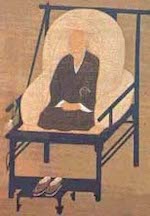Koso Wasan 57
Sentient beings of the five defilements in the last dharma-age
May perform the practices of the Path of Sages,
But not one will thereby attain realisation;
So states the World-honoured one, the master of the teaching.
The Path of Sages

The Path of Sages is made up of the six paramitas: generosity, observance of the precepts, perseverance, effort, meditation and wisdom. The paramitas must become a natural part of one's being. For that to happen, the times and environment must be suitable.
With the path of difficult practice, it is seeking non-retrogression in this world of five defilements at a time when there is no Buddha that is difficult. This difficulty appears in many ways; I will indicate what is meant by roughly listing several of them.
The apparent good practiced in non-buddhist ways is confused with the dharma of the bodhisattva.
The sravaka's concentration on self-benefit diverts a bodhisattva's practice of great compassion.
Evildoers lacking self-reflection subvert the excellent merits of others.
The results of good acts undertaken with inverted thinking nullify the bodhisattva's pure practice for enlightenment.
The path of difficult practice is based solely on self-power and lacks the support of Other Power.
Such problems as these, which may be seen everywhere, are examples of the difficulty.1
This passage from T'an-luan's Commentary on Vasubandhu's Discourse on the Pure Land provides a powerful demonstration of just why it is that the path of sages has become 'difficult'. It is not because the six paramitas are necessarily exacting or demanding; that perspective is present in only one of T'an-luan's five reasons. The problem lies with the insidious nature of the five defilements; our self-deception, the delusions of those who offer themselves as our teachers and the fact that there is no Buddha to guide us. These are the things that impressed Tao-ch'o so strongly.
The six paramitas are really not impossible for many people to uphold. Indeed, T'an-luan must have practiced them effortlessly, since he was considered by those who knew him to be a genuine Bodhisattva. It is not so much the effort needed in pursuing the bodhisattva way that defeats us. The problem is, rather, the confusion and darkness that fills our minds - and the world. To repeat the words of T'an-luan, above.
'The results of good acts undertaken with inverted thinking nullify the bodhisattva's pure practice for enlightenment'.
Tao-ch'o undoubtedly pondered T'an-luan's list of reasons for supporting the Pure Land way. To my mind, the list offers five points that are unarguable. If we are honest and think through each item carefully, we will discover the truth of their contention for ourselves. We will come to a point at which we have not the slightest doubt that - as Tao-ch'o was to proclaim - the only sure path that is available to us is the Pure Land Way of Namo Amida Butsu.
1: CWS, p. 25